CloudAccel Hardware Acceleration of Machine Learning Applications in the Cloud
About CloudAccel
Emerging web applications like cloud computing, machine learning and big data analytics have increased significantly the workload on the data centres during the last years. Most of these applications are computational intensive and typical server processors cannot sustain the exponential increase of the network traffic of computation intensive applications. A solution that can be used to overcome this problem is the use of hardware accelerators such as the ones based on FPGA. The use of highly specialized hardware accelerator can greatly advance server processors and can also increase significantly the performance of data centres given a fixed power budget.
The main objective of the CloudAccel project is to develop high performance hardware accelerators for widely used machine learning, graph computations and data analytics applications. The accelerators will be developed in the form of IP (Intellectual Property) cores and will be compatible to be uploaded, e.g. to the Amazon AWS webstore to be used as an instance by the cloud software developers. Since many hardware accelerators can be more efficient if they are optimized for specific dataset and workloads, CloudAccel will also develop a framework that will allow the automatic generator for hardware accelerators optimized not only for a specific machine learning application but also for the specific dataset and workloads (e.g. training set) that need to accelerate.
During this project, we will develop the configurable hardware accelerators in the form of IP cores for high performance FPGA-based hardware accelerators for widely used machine learning and graph computations applications. These templates will be developed in typical programming languages such as C or C++ that can be transformed to hardware through high level synthesis by inserting the right annotations (pragmas) for the efficient mapping in hardware resources. However, hardware accelerators cannot be easily configured to meet the application requirements with different datasets (input data, size of the arrays, etc.). Hardware platforms do not support the flexibility of software programming like dynamic memory management, and thus higher programming complexity is required for the efficient mapping of the kernel to the available hardware resources. Therefore, the main goal of the project will be the development of the hardware generators that will allow the automatic creating of hardware accelerators that are being optimized for the user’s datasets and application parameters. Finally, the last step will be the development of the required libraries and APIs for the specific kernels.
Specifically, we will develop the APIs and the libraries for the widely-used frameworks such as Apache Spark, Torch, Google Tensorflow and Caffe that will make the use of the accelerators easy to instantiate and use by software and cloud programmers. The hardware accelerators will first be tested and validated in the local infrastructure (FPGA boards hosted in desktop PC through the PCIe interface and using the Xilinx SDAccel framework). After the verification and validation of the designs, the IP cores will be uploaded to online market places that support heterogeneous (FPGA) data center infrastructure such as Amazon AWS, IBM suppervessel and Google Cloud platform.
Publications
Book Chapters
- A quantitative comparison for Image Recognition on accelerated Heterogeneous Cloud Infrastructure Dimitris Danopoulos, Christoforos Kachris, Dimitrios Soudris, Heterogeneous Computing Architectures, Challenges and Visions Taylor and Francis Publications, 2019
International Journals
- Utilizing Cloud FPGAs towards the Open Neural Network Standard
Dimitris Danopoulos, Christoforos Kachris, Dimitrios Soudris
Sustainable Computing: Informatics and Systems Volume 30, June 2021, 100520
International Conferences
-
FPGA Acceleration of Generative Adversarial Networks for Image Reconstruction Dimitris Danopoulos, Konstantinos Anagnostopoulos, Christoforos Kachris, Dimitrios Soudris 10th International Conference on Circuits and Systems Technologies (MOCAST 2021), September 2021
-
Covid4HPC: A Fast and Accurate Solution for Covid Detection in the Cloud using X-Rays, Dimitrios Danopoulos, Christoforos Kachris and Dimitrios Soudris, International Symposium on Applied Reconfigurable Computing, ARC 2021, July 2021, Github repo
-
Utilizing Cloud FPGAs towards the Open Neural Network Standard
Dimitris Danopoulos, Christoforos Kachris, Dimitrios Soudris
11th IEEE International Green and Sustainable Computing Conference (IGSC 2020), October 2020, Presentation -
Hardware Acceleration of Decision Tree Learning Algorithm
Asim Zoulkarni, Christoforos Kachris, Dimitrios Soudris
8th International Conference on Modern Circuits and Systems Technologies (MOCAST), September 2020 (Best Paper Award nomination), Video -
Automatic Generation of FPGA Kernels From Open Format CNN Models
Dimitris Danopoulos, Christoforos Kachris, Dimitrios Soudris
2020 IEEE 28th Annual International Symposium on Field-Programmable Custom Computing Machines (FCCM) pp. 237-237, May 2020, Poster -
Hardware Acceleration on Gaussian Naive Bayes Machine Learning Algorithm
Georgios Tzanos, Christoforos Kachris, Dimitrios Soudris
8th International Conference on Modern Circuits and Systems Technologies (MOCAST) 13-15 May 2019, Thessaloniki, Greece -
Approximate Similarity Search with FAISS framework using FPGAs on the cloud
Dimitris Danopoulos, Christoforos Kachris, Dimitrios Soudris
International Conference on Embedded Computer Systems, Architecture Modeling and Simulation (SAMOS) July 7-11 2019, Samos Greece, Github repo -
FPGA Acceleration of Approximate KNN Indexing on High-Dimensional Vectors
Dimitris Danopoulos, Christoforos Kachris, Dimitrios Soudris
14th International Symposium on Reconfigurable Communication-centric Systems-on-Chip (ReCoSoC 2019) July 1-3 2019, York - United Kingdom, Presentation
Source codes
Library of Accelerators
Awards
NTUA Student granted the first place in the Open Hardware Contest organized by Xilinx in 2021 for the work on GANs.
ECE-NTUA Ph.D. student Dimitris Danopoulos, supervised by research associate Dr. Christoforos Kachris and Professor Dimitrios Soudris, developed a novel platform for the hardware acceleration of Image Reconstruction algorithms with GANs (Generative Adversarial Networks) and won first place in 2021 Xilinx Open Hardware Competition. The accelerator was developed in the Microprocessors and Digital Systems Lab of the School of Electrical and Computer Engineering of the National Technical University of Athens.
Specifically, Dimitris Danopoulos participated in the Compute Acceleration category of the competition and has received an award for his work on the acceleration of image reconstruction algorithms with GAN. The Generator neural network model trained on Tensorflow takes as input the top half of a clothing image and generates/predicts the bottom half. The accelerator was implemented in High Level Synthesis and has been ported on a Xilinx Alveo FPGA. The architecture also achieves significant performance and power efficiency compared to other platforms like GPUs.
The work has been done under the project “CloudAccel: Hardware Acceleration of Machine Learning Applications in the Cloud” that has received funding from the Hellenic Foundation for Research and Innovation (HFRI) and the Genal Secretariat for Research and Technology (GSRT) under grant agreement no 2212 and the Xilinx University Program.
The project is available on GitHub:
A video showing the main novelties of this platform is shown here:
NTUA student Dimitris Danopoulos won the 2nd prize on Adaptive Computing Developer Contest for his work on CloudAccel!
Covid4HPC - A fast and accurate solution for Covid detection Detecting Covid-19 from X-Ray images using CNNs on cloud FPGA
The CNN model was trained with hardware-aware optimizations then was quantized to 8-bit and finally compiled to run on Xilinx Alveo U50 FPGA through Vitis AI. To the best of our knowledge, this application has not yet been considered for cloud FPGAs while the accuracy and speed achieved surpasses any previous known implementation of CNNs for X-Ray Covid detection. Specifically, it can classify X-Ray images at a rate of 3600 FPS with 97% accuracy and a speed-up of 17.6x vs CPU and 3x vs GPU.
Check the video here
Dimitris Danopoulos awarded the HiPEAC paper award for the FCCM Paper 2020
Dimitris Danopoulos, CHristoforos Kachris and Dimitrios Soudris, have been awarded the HiPEAC 2020 paper award for his paper on the top-rated FPGA conference FCCM.
Automatic Generation of FPGA Kernels From Open Format CNN Models
Dimitris Danopoulos, Christoforos Kachris, Dimitrios Soudris
2020 IEEE 28th Annual International Symposium on Field-Programmable Custom Computing Machines (FCCM)
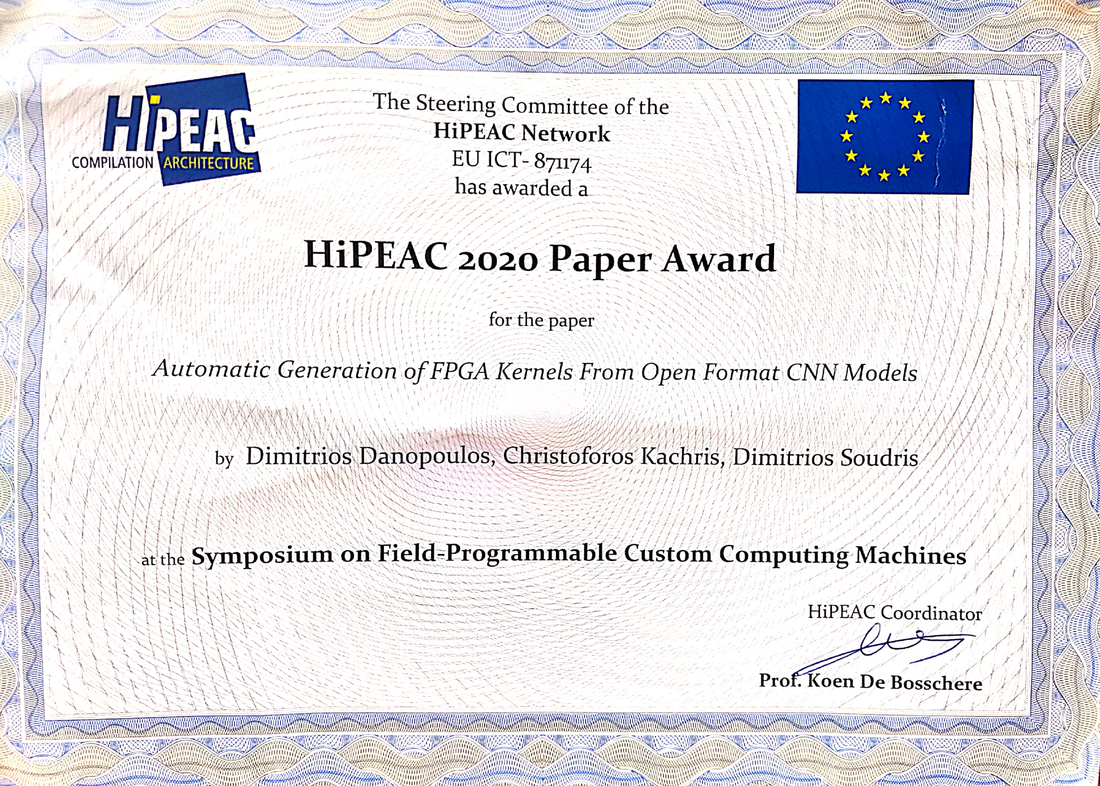
NTUA Students granted the first place in the Open Hardware Contest 2019 organized by Xilinx in 2 categories
Students Dimitris Danopoulos and George Tzanos, supervised by research associate Dr. Christoforos Kachris and Prof. Dimitrios Soudris, developed a novel platform for the hardware acceleration of machine learning applications. The platform was developed from the Microprocessors Lab (National Technical University of Athens).
Specifically, Dimitris Danopoulos received the first price on the hardware acceleration category for his work on the acceleration of FAISS; a widely used application for efficient similarity search and clustering of dense vectors in a Xilinx Alveo FPGA board and cloud FPGA.
George Tzanos received the first price on the pynq category (using the Zynq SoC) for the efficient acceleration of the Naïve Bayes algorithm for training and classification.
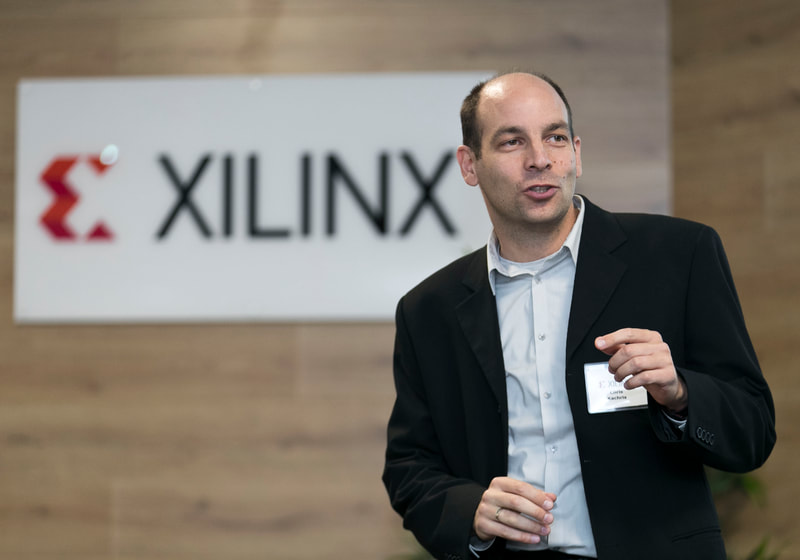
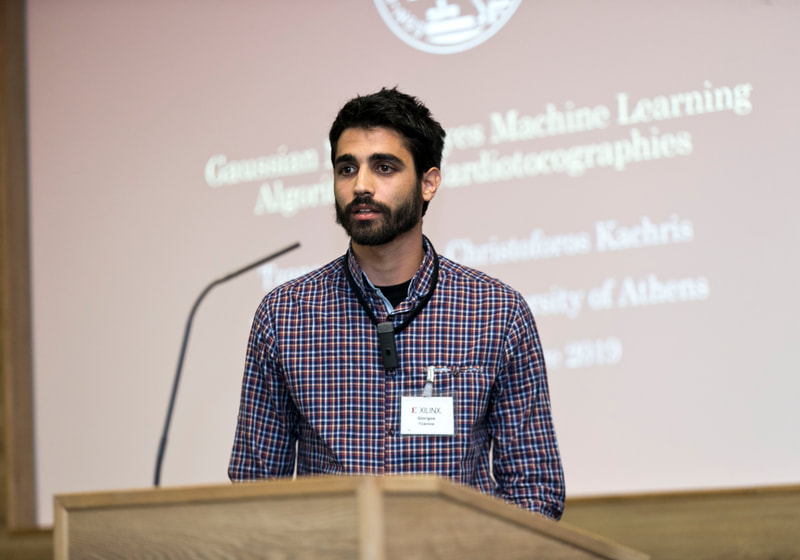
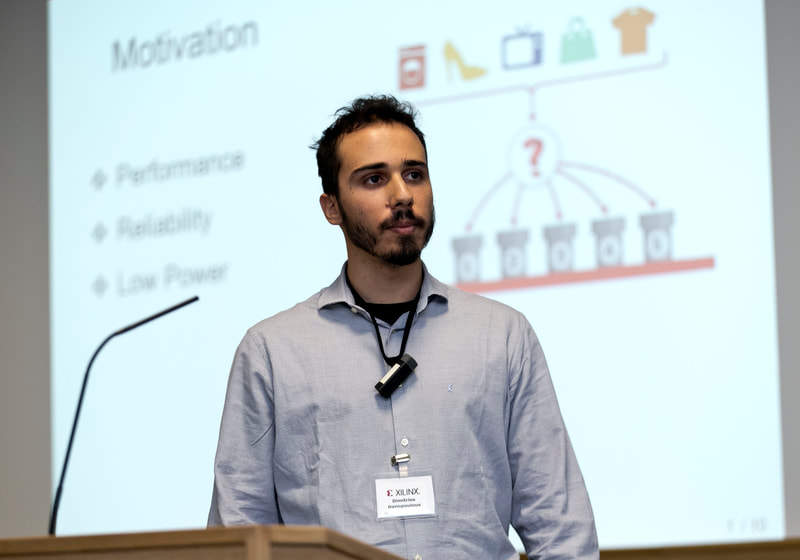
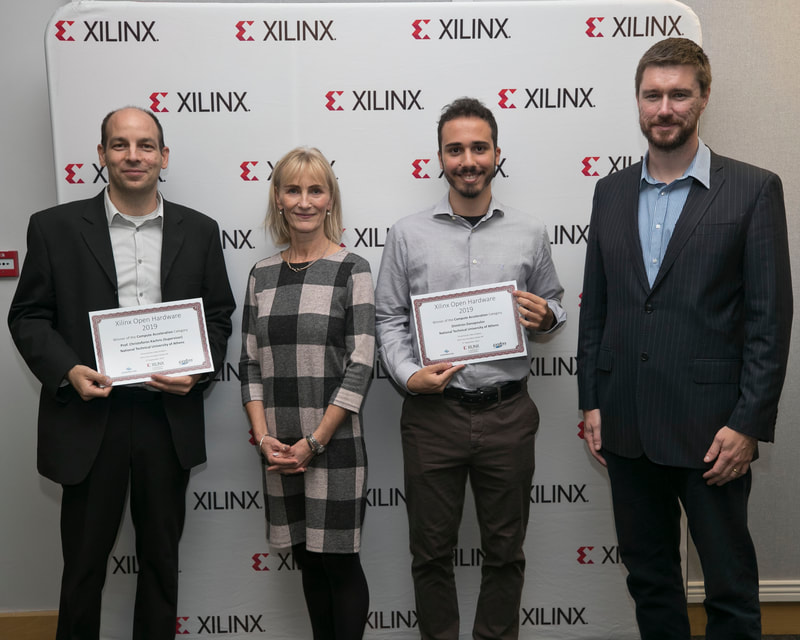
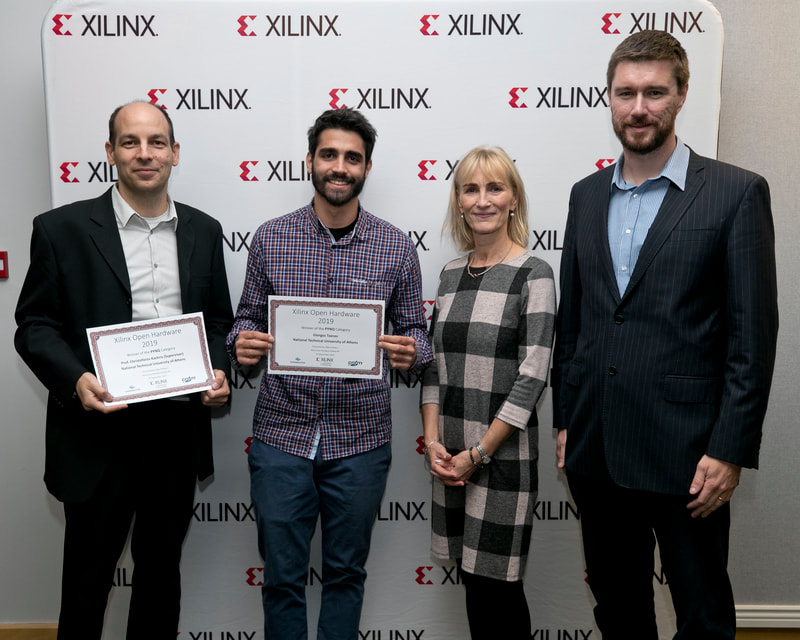
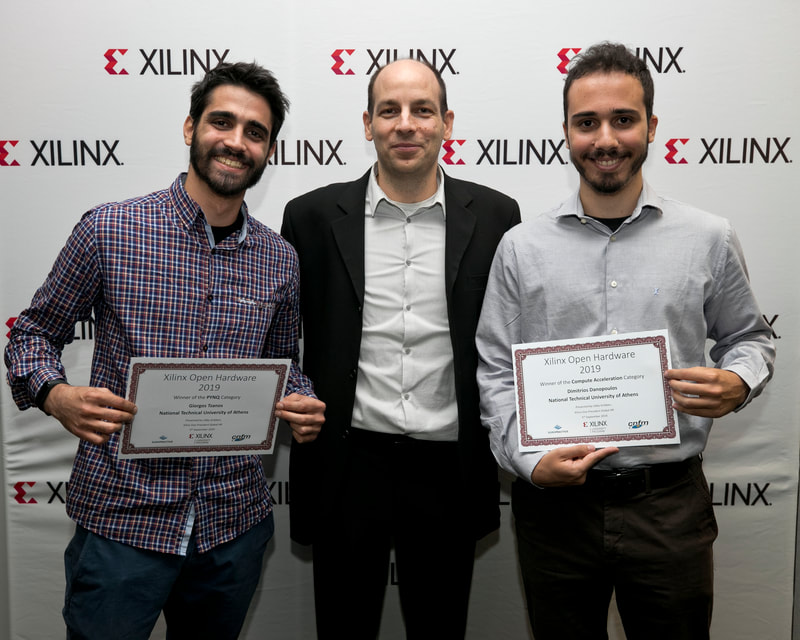
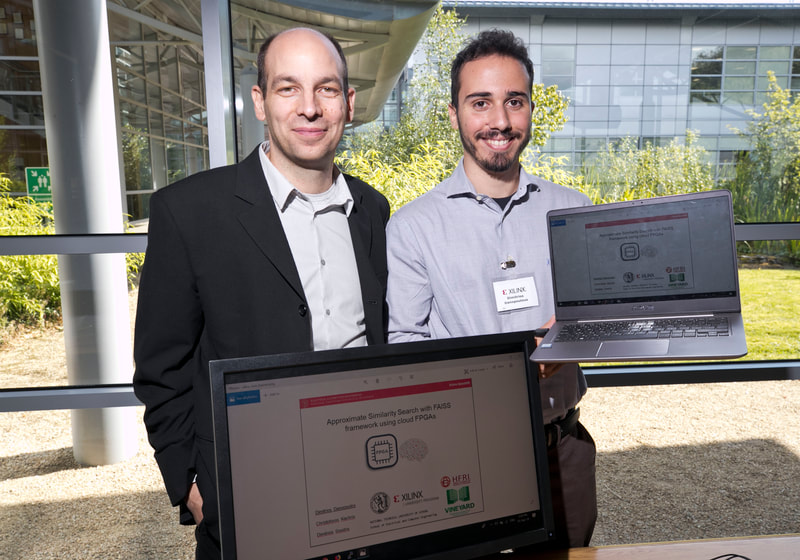
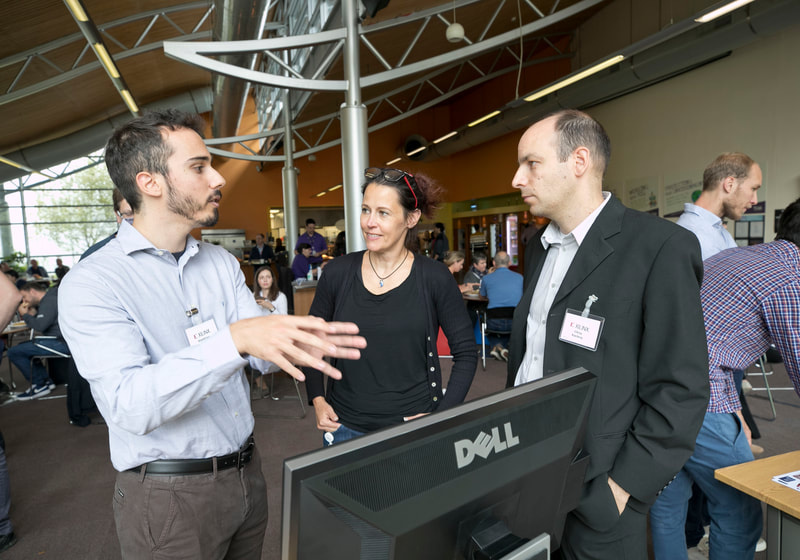
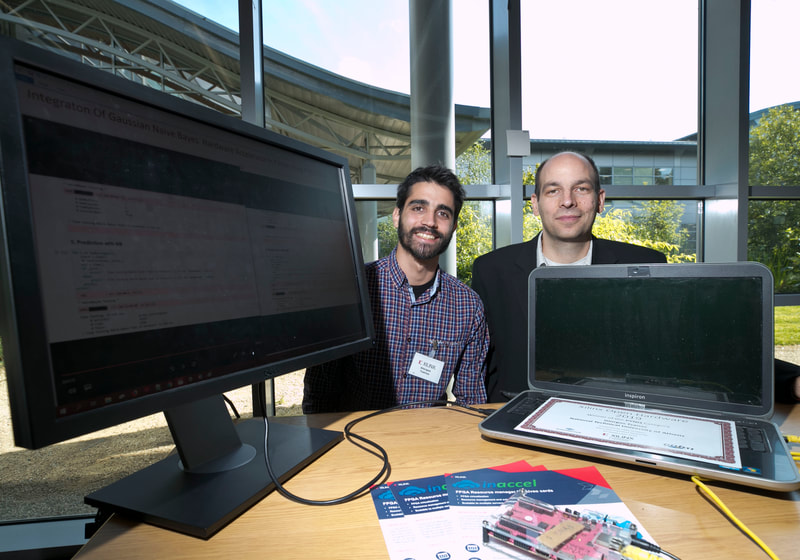
Articles
Speedup KNN algorithms using FPGAs
Contact
Christoforos Kachris
National Technical University of Athens (NTUA) School of Electrical & Computer Engineering Department of Computer Science 9 Heroon Polytechneiou, Zographou Campus 157 80 Athens - Greece
Email: kachris @ microlab [dot] ntua [dot] gr
This project has received funding from the Hellenic Foundation for Research and Innovation (HFRI) and the Genal Secretariat for Research and Technology (GSRT), under grant agreement no 2212 project “CloudAccel: Hardware Acceleration of Machine Learning Applications in the Cloud”.